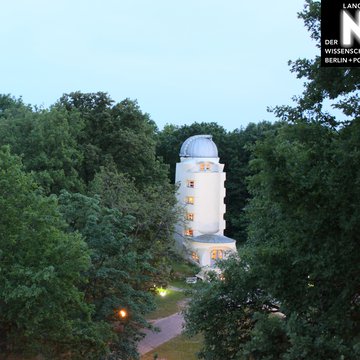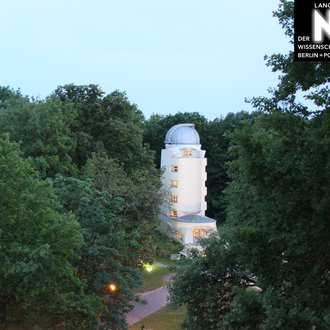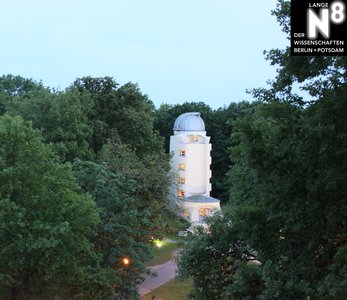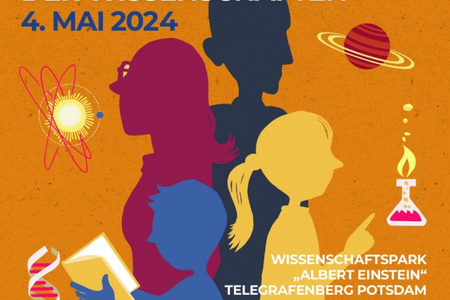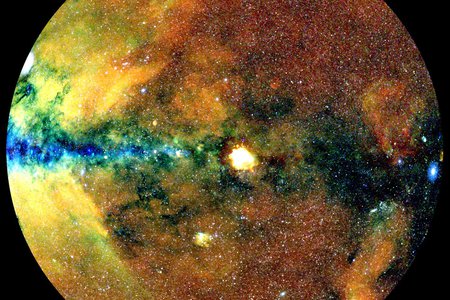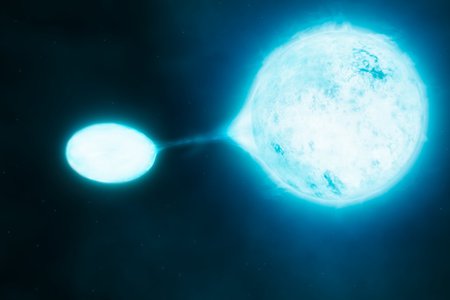Journey to Infinity: Long Night of the Sciences 2018
The Leibniz Institute for Astrophysics Potsdam (AIP) is once again involved with offers on the Telegrafenberg at the Long Night of Sciences on June 9, 2018 from 5 to 11 pm. Visitors to the historical sites will get an exciting insight into the history, present and future of astronomy "Made in Potsdam".
With the Einstein Tower - once the most scientifically important solar telescope in Europe - a story began that is still going on today. At the Long Night of Sciences, scientists give an insight into modern solar research from Potsdam.
The Great Refractor opens its doors again and invites you to wonder: in lectures, the guests can learn more about distant exoplanets or cool neighbor stars, make star charts and - in suitable weather - the night sky over Potsdam through the telescope.
The programme in the Einstein Tower
6 p.m.: apl. Prof. Dr. Carsten Denker – Das Europäische Sonnenteleskop (EST) - Ein neues Sonnenteleskop für hochaufgelöste Sonnenbeobachtung
7 p.m.: Dr. Christoph Kuckein – Die Sonne und Europas größtes Sonnenteleskop GREGOR
8 p.m.: Dr. Meetu Verma (in English) – The Dynamic Sun
9 p.m.: Dr. Christian Vocks – Die Sonne - unser nächster Stern
10 p.m.: Dr. Horst Balthasar – Die Sonne und Europas größtes Sonnenteleskop GREGOR
The programme in the Great Refractor
6 p.m.: Dr. Ernst-August Gußmann –Der Große Refraktor: Zeitzeuge der Astronomie im 20. Jahrhundert
7 p.m.: Engin Keles – Exoplaneten: Die Suche nach der zweiten Erde
8 p.m.: Dr. Ralf-Dieter Scholz –Coole Nachbarsterne
9 p.m.: Live music– Jazz-Session with the Bigge-Meinig-Duo
from 10 p.m.: Observation at Great Refractor – after dark and only with a clear view
The Leibniz Institute for Astrophysics Potsdam (AIP) is once again involved with offers on the Telegrafenberg at the Long Night of Sciences on June 9, 2018 from 5 to 11 pm. Visitors to the historical sites will get an exciting insight into the history, present and future of astronomy "Made in Potsdam".
With the Einstein Tower - once the most scientifically important solar telescope in Europe - a story began that is still going on today. At the Long Night of Sciences, scientists give an insight into modern solar research from Potsdam.
The Great Refractor opens its doors again and invites you to wonder: in lectures, the guests can learn more about distant exoplanets or cool neighbor stars, make star charts and - in suitable weather - the night sky over Potsdam through the telescope.
The programme in the Einstein Tower
6 p.m.: apl. Prof. Dr. Carsten Denker – Das Europäische Sonnenteleskop (EST) - Ein neues Sonnenteleskop für hochaufgelöste Sonnenbeobachtung
7 p.m.: Dr. Christoph Kuckein – Die Sonne und Europas größtes Sonnenteleskop GREGOR
8 p.m.: Dr. Meetu Verma (in English) – The Dynamic Sun
9 p.m.: Dr. Christian Vocks – Die Sonne - unser nächster Stern
10 p.m.: Dr. Horst Balthasar – Die Sonne und Europas größtes Sonnenteleskop GREGOR
The programme in the Great Refractor
6 p.m.: Dr. Ernst-August Gußmann –Der Große Refraktor: Zeitzeuge der Astronomie im 20. Jahrhundert
7 p.m.: Engin Keles – Exoplaneten: Die Suche nach der zweiten Erde
8 p.m.: Dr. Ralf-Dieter Scholz –Coole Nachbarsterne
9 p.m.: Live music– Jazz-Session with the Bigge-Meinig-Duo
from 10 p.m.: Observation at Great Refractor – after dark and only with a clear view
Images
Einstein Tower in the dusk.
Big screen size [1000 x 862, 170 KB]
Original size [3665 x 3160, 1.4 MB]
